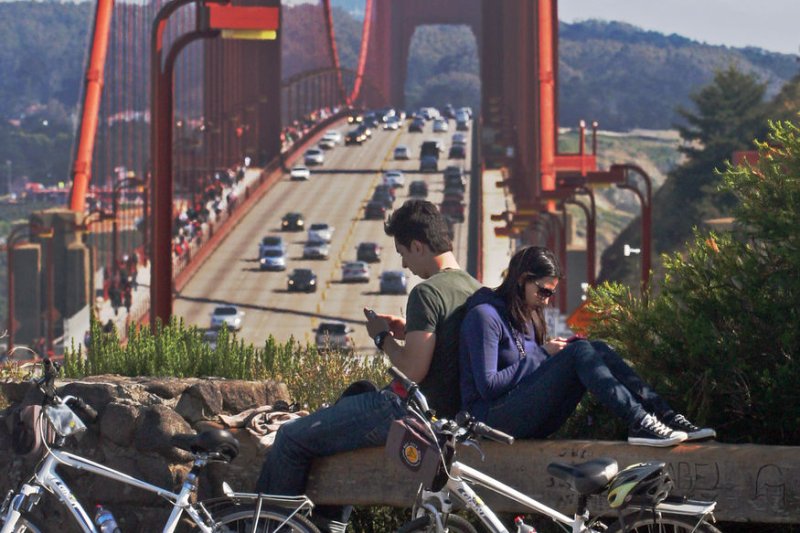Bicyclists check their phones while resting at Vista Point on the north end of the Golden Gate Bridge in Sausalito, Calif. File Photo by David Yee/UPI |
License Photo
Dec. 13 (UPI) -- State regulators in California have proposed a plan to charge mobile phone users a monthly fee for sending text messages -- basically a text tax.
A 52-page proposal by California Public Utilities Commission Carla J. Peterman outlined the plan to charge text messaging users a monthly surcharge under the Public Purpose Program -- which would use the tax revenue to fund access to affordable telecommunications services for low-income residents.
The CPUC said the tax would be necessary to fund the program, as revenue garnered from a tax on voice calls through telephone services has decreased from $16.5 billion in 2011 to $11.3 billion last year. California's Public Purpose Program budget increased from $670 million to $998 million throughout the same time period.
The CPUC report says it is unsustainable for the Public Purpose Program to continue with shrinking revenue if not subsidized by a new source.
"From a consumer's point of view, surcharges may be a wash, because if more surcharge revenues come from texting services, less would be needed from voice services," CPUC spokeswoman Constance Gordon said in a statement, to The Mercury News. "Generally, those consumers who create greater texting revenues may pay a bit more, whereas consumers using more voice services may pay less."
The commission will vote on the measure Jan. 10, while facing opposition from the wireless communication industry and some business groups.
Some advocates say a text tax is a misguided effort that harms consumers.
In legal filings on the proposal, the Cellular Telecommunications Industry Association, a trade organization representing the wireless communications industry, said it's "repeatedly" demonstrated that text messaging is an "information service" similar to email -- not a telecommunications service like voice calls.
"Subjecting wireless carriers' text messaging traffic to surcharges that cannot be applied to the lion's share of messaging traffic and messaging providers is illogical, anti-competitive and harmful to consumers," the CTIA said.
On Wednesday, the Federal Communication Commission denied requests by mass-texting companies to classify text messaging services as a telecommunications service. Its ruling affirmed their classification as information services -- and establishes that text messages aren't subject to regulation under the Communications Act.
A collection of business groups, including the California Chamber of Commerce and the Bay Area Council, sent a letter to the CPUC opposing the proposed text tax.
"It's a dumb idea," Bay Area Council President and CEO Jim Wunderman told UPI. "There's a lack of common sense that goes with trying to tax the most basic form of communication that our society has evolved into.
"It's relied upon by hundreds of millions of people, especially young people who use text messaging more than their elders do and who are probably less in a position to afford a tax on something they rely on so much every hour of every day."
The business coalition argues the Public Purpose Programs are sufficiently funded with nearly $1 billion in their budget -- and warns a text tax would cost Californians $44.5 million per year, and could add up to more than $220 million if applied retroactively for five years.
"On the face of it, it's an unnecessary tax," Wunderman said. "They're not rushing to solve a fiscal problem because we don't have [one]."
Additionally, the business groups say the tax would effectively double-charge consumers who already pay into the Public Purpose Programs via a surcharge on voice calls -- and would put undue pressure on low-income wireless users. Their letter says a wireless household of two people making a combined income of $28,000 -- above the threshold for discounted phone service through the FCC's LifeLine program -- would have to pay the tax, whereas only one member of a qualifying LifeLine household would be exempt.
"It's another tax in a state where taxes are already high," Wunderman said. "It's going to have a particularly impactful effect on younger people and lower income people who are going to have to pay this -- and they're going to feel it, and they use it the most."
Both business and telecommunications groups warn a text tax could also have another unintended consequence -- and drive consumers to Internet-based messaging, like Snapchat and Whatsapp, to dodge the fees.
"People don't like to pay taxes and they'll find another way if there's another way to be found," Wunderman said.















